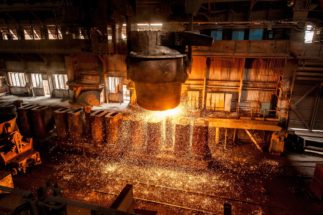
How to choose the right refractory metal for your project
Refractory metals are a range of metal elements that withstand extensive amounts of heat, due to their extremely high melting point. As the refractory metals resist the effects of heat, corrosion, and wear, they are the perfect material for any project that is exposed to high temperatures.
At China Special Metal Parts, Inc., we offer our customers specialised services including supply, machining and fabrication of the following refractory metals:
Molybdenum
What is molybdenum?
Molybdenum is characterised by its capacity to maintain structure whilst operating in oppressive heat. It has one of the highest liquefaction values of all metal elements – melting at an impressive 2620°C.
Molybdenum also contains extremely elevated electrical and thermal components, whilst also reducing fragility and enhancing strength.
What can molybdenum be used for?
Molybdenum is one of the most versatile refractory metals, making it an ideal material for a variety of projects. The most common uses of molybdenum include:
- Medical materials – Technetium-99 (T-99) is the isotope used for diagnostic imaging such as X-rays, CT scans, nuclear medicine checks, MRI, and Ultrasound. T-99 is produced through the decay of Molybdenum-99.
- Lighting products – Molybdenum is used to construct various lighting structures, including reflectors to prevent headlights blinding other drivers, due to its resistance to heat and its mechanical durability.
Niobium
What is niobium?
Niobium is a shiny white metal that forms an oxide layer in the air, enabling corrosion-resistance. It is also one of the major refractory metals to resist high levels of heat and damage. It also changes colour when exposed to air, resulting in shades of yellow, green or blue.
What are the main niobium applications?
Niobium has an array of functions, although the most prevalent applications include:
- Alloying agent – Niobium is utilised for superalloys on jet engines, due to its extensive ability to resist heat and enable a strengthening effect.
- Jewellery – Niobium is the perfect material for crafting jewellery, as it does not contain nickel alloys, which are usually the main cause of allergies. The changing colours of the metal also make it the perfect application for jewellery, as it is naturally coloured, which means the colour will not chip.
Tantalum
What Is tantalum?
Tantalum is a heavy metallic element that is highly resilient to chemical attacks below 150°C, and similar to Niobium resists corrosion due to its surface-based oxide film.
It is produced through a sintering process, which enables the formation of a metal that withstands a melting point of 2990°C with vast conductivity.
Why is tantalum used?
There are a variety of uses for tantalum due to its resilient capacity, although the main uses include:
- Electronic materials – a component of Tantalum – Lithium tantalate – is used in capacitors for electronic devices in order to produce surface acoustic wave filters for mobile phones and televisions. Tantalum powder is also used to help power electronic circuits in portable electronics and even airbag activation.
- Medical appliances – as Tantalum is extremely bio-compatible it can be used to create prosthetic devices, including blood vessel stents, skull plates and repair mesh for damaged bones.
Titanium
What is titanium?
Titanium is a lightweight and robust refractory metal which provides resistance from chemical and water corrosion, enabled by a surface layer of titanium dioxide, which makes it extremely tough to infiltrate.
What are the advantages of using titanium?
Titanium has extremely unique properties which makes it an essential element for the following products:
- Aircraft materials – Titanium is a key component of aircraft construction, as it provides impenetrability whilst also being extremely lightweight, which is an essential benefit to both aerospace engineers and aircraft manufacturers.
- Water-based structures – Titanium offers extremely high resilience against seawater, which makes it the perfect element for constructing propeller shafts and ship hulls in order to avoid corrosion.
Tungsten
What is Tungsten?
Tungsten’s melting point of 3422 °C is the highest of all the refractory metals, making it one of the most robust materials to be discovered in nature. It also extremely unyielding to deterioration, allowing it to be used in the toughest conditions.
Where can Tungsten be utilised?
Tungsten’s extensive durability allows it to be used for a variety of functions, including:
- Diamond cutting – Tungsten carbide is used in drill bits due to its extreme density, allowing faster and more efficient diamond cutting services. It can also be used by jewellers themselves to create various jewellery such as wedding rings.
- Military equipment – Tungsten is utilised to construct bullets and missiles, as an extremely dense material is needed for these weapon types, in order to breach defence materials.
Zirconium
What is zirconium?
Zirconium is a transitional metal that is extremely flexible and resilient to erosion from both alkalis, acids and other corrosive agents, due to its thin oxide film.
An advantage of Zirconium is that its ability to absorb neutrons is basically non-existent, which means it is perfect for industries such as nuclear manufacturing.
What is the purpose of using zirconium?
Zirconium has an abundance of properties that make it an essential component for various industries, including:
- Nuclear power stations – over 90%of zirconium is used for nuclear reactors and is one of the main materials used for the fuel rods within cladding and outer covers, which enable a nuclear reaction.
- Chemical industries – Zirconium’s substantial resilience to erosion enables it to be used in corrosive environments where zirconium’s alloying agent can be implemented within heat exchangers and pipes.
How Special Metals can help
At China Special Metal Parts, Inc., we have extensive experience working with refractory metals, which we use in our favour to provide our customers with a first-rate service.
Request a quick quote today or for further information regarding our services, please contact us on +86-755-29936699.

Leave a response
Your email address will not be published. Please enter your name, email and a comment.